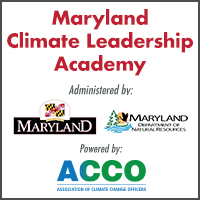Prep Series for the Certified Climate Change Professional Credential® (CC-P®)
Upcoming CC-P®
Prep Programs
Enrollment for the following programs is now open. Applications are due by October 15, 2018.
Cohort A
Chesapeake College
Class #1: November 19-20, 2018
Class #2: January 24-25, 2019
Class #3: April 9-10, 2019
Cohort B
Hagerstown Community College
Class #1: December 5-6, 2018
Class #2: February 19-20, 2019
Class #3: May 7-8, 2019
Cohort C
DC/Baltimore Metro Area TBA
Class #1: December 18-19, 2018
Class #2: March 2019 (TBA)
Class #3: May 2019 (TBA)
This 6-month program is designed to help participants build competencies to effectively integrate climate change into their decision-making and professional activities, as well as to advance their entrepreneurship and leadership skills. Leveraging a combination of on-demand online training resources and in-person cohort training, this workshop series will help attendees earn the Certified Climate Change Professional® (CC-P®) credential by preparing them for exams and satisfying most elective requirements.
The curriculum in this training series will be regionally tailored for Maryland and the mid-Atlantic United States. Professionals across occupations and leadership roles in the public/private sectors, higher education and the NGO community will benefit from this series.
About the Certified Climate Change Professional® (CC-P®) Credential
As the implications of climate change on operations, missions and organizational interests, demand for skilled and seasoned professionals able to integrate an understanding of climate change and related response strategies into decision-making across professional functions will surge. Earning the Certified Climate Change Professional® (CC-P®) signifies that you have developed the fundamentals skills and knowledge to effectively support climate change initiatives and connects you to the premier community of professionals, organizations and experts worldwide.
Who Should Enroll
Mid-level practitioners and senior executives in local/state government agencies and the private sector with roles related to planning, infrastructure, emergency management, energy, facilities, resilience, sustainability, environment, operations or risk management
Non-profit organization staff working with local/state government agencies on resilience, sustainability, economic development or public health planning
Faculty in higher-education institutions and community colleges teaching in programs related to public policy, business management, civil engineering, public health, emergency management and law
